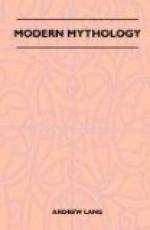The Origin of Death
Civilised man in a scientific age would never invent a myth to account for ‘God’s great ordinance of death.’ He regards it as a fact, obvious and necessarily universal; but his own children have not attained to his belief in death. The certainty and universality of death do not enter into the thoughts of our little ones.
For in the thought of immortality
Do children play about the flowery
meads.
Now, there are still many childlike tribes of men who practically disbelieve in death. To them death is always a surprise and an accident—an unnecessary, irrelevant intrusion on the living world. ‘Natural deaths are by many tribes regarded as supernatural,’ says Dr. Tylor. These tribes have no conception of death as the inevitable, eventual obstruction and cessation of the powers of the bodily machine; the stopping of the pulses and processes of life by violence or decay or disease. To persons who regard Death thus, his intrusion into the world (for Death, of course, is thought to be a person) stands in great need of explanation. That explanation, as usual, is given in myths.
Death, regarded as Unnatural
But before studying these widely different myths, let us first establish the fact that death really is regarded as something non-natural and intrusive. The modern savage readily believes in and accounts in a scientific way for violent deaths. The spear or club breaks or crushes a hole in a man, and his soul flies out. But the deaths he disbelieves in are natural deaths. These he is obliged to explain as produced by some supernatural cause, generally the action of malevolent spirits impelled by witches. Thus the savage holds that, violence apart and the action of witches apart, man would even now be immortal. ’There are rude races of Australia and South America,’ writes Dr. Tylor, {178} ’whose intense belief in witchcraft has led them to declare that if men were never bewitched, and never killed by violence, they would never die at all. Like the Australians, the Africans will inquire of their dead “what sorcerer slew them by his wicked arts."’ ‘The natives,’ says Sir George Grey, speaking of the Australians, ’do not believe that there is such a thing as death from natural causes.’ On the death of an Australian native from disease, a kind of magical coroner’s inquest is held by the conjurers of the tribe, and the direction in which the wizard lives who slew the dead man is ascertained by the movements of worms and insects. The process is described at full length by Mr. Brough Smyth in his Aborigines of Victoria (i. 98-102). Turning from Australia to Hindustan, we find that the Puwarrees (according to Heber’s narrative) attribute all natural deaths to a supernatural cause—namely, witchcraft. That is, the Puwarrees do not yet believe in the universality




